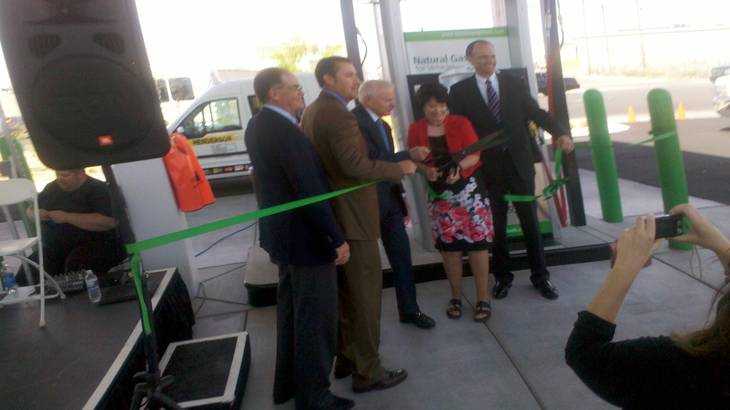Map
Clean Energy Fuels Corp., the compressed natural gas fueling company developed by T. Boone Pickens in 1997, opened a public access station near McCarran International Airport today, generating hope that it will lead a transition of Southern Nevada’s fleet transportation companies away from gasoline-powered vehicles.
Representatives of the state, Clark County, Henderson, Las Vegas, Sen. Harry Reid and Reps. Shelley Berkley and Joe Heck attended the kickoff of the station on the east side of Paradise Road, south of Tropicana Avenue.
It is Clean Energy’s seventh public access fueling station in Southern Nevada, making Las Vegas among the first cities in the country with infrastructure to support the expanded deployment of natural gas vehicle fleets.
Brent Bell, president of Whittlesea Bell Transportation, which owns taxi, shuttle bus and limousine subsidiaries and the land on which the new station is located; Jeff Shaw, CEO of Southwest Gas, the primary natural gas utility company in the state; and Clean Energy Chairman Warren Mitchell spoke at a reception.
Mitchell said the station is his company’s 25th airport location, ideally sited to service tourism transportation. Clean Energy has 230 stations nationwide with 50 built in 2010 and 100 more expected to be built this year, he said.
Compressed natural gas is considered one of the most favored of alternative fuels for vehicles because it is abundant, cleaner burning and less expensive than most other fuels. Ninety-eight percent of the nation’s natural gas is produced in North America, which has an estimated 120-year supply, and it emits an estimated 30 percent less greenhouse gas volume than gasoline- or diesel-fueled vehicles.
Vehicles get about the same mileage per gallon of fuel, but compressed natural gas costs about $1.50 a gallon.
But Bell cautioned that the jury is still out on how quickly Southern Nevada’s transportation industry could transition to compressed natural gas. Bell’s company has acquired eight such shuttle buses and 10 Ford Transit Connect taxis. It also is running converted Ford Escapes.
Bell said it costs about $10,800 to convert a gasoline-powered cab to compressed natural gas. Under a federal tax credit plan that has expired, companies were able to recover $4,500 per vehicle in credits. The conversion includes adding a 15-gallon, 4½-by-2 foot tank that eats up cargo space that had been used for suitcases.
“In the long run, it’s going to be worth it to convert,” said Bell, whose company began evaluating vehicle efficiencies when gasoline approached $4 a gallon. Bell is analyzing how many conversions it could accomplish without the tax credit.
He said lawmakers are considering re-enacting the credit, but he’s not counting on it in his evaluation.
The leaders of other transportation companies have contacted Bell about the performance of his compressed natural gas vehicles.
Frias Group, which operates several companies that represent the largest transportation fleet, was among the companies inquiring. Yellow-Checker-Star, another major operator, uses propane, liquefied petroleum gas, to power its vehicles and has its own fueling station.
Andrew Turonie, a Henderson Taxi driver who is using a compressed natural gas-fueled cab, said the performance is about the same as a gasoline-powered vehicle. He averages about 150 miles per 12-hour shift.
He said he really appreciates the lower cost of the fuel since his contract requires him to buy it. The company splits with drivers a rebate it gets for using alternative fuels.
Because it is new, Shaw said he doesn’t know how much compressed natural gas the new station will sell.
“We view it as a new, but very good commercial customer,” he said.
And adding new customers, he said, increases revenue margins, which delays the need for rate increases it requests from the Public Utilities Commission.
Southwest Gas won’t be lobbying to reinstate tax credits for compressed natural gas conversions, adding that a better strategy may be persuading automakers to develop more compressed natural gas-powered vehicles and build the engines and fuel systems on the front end.
